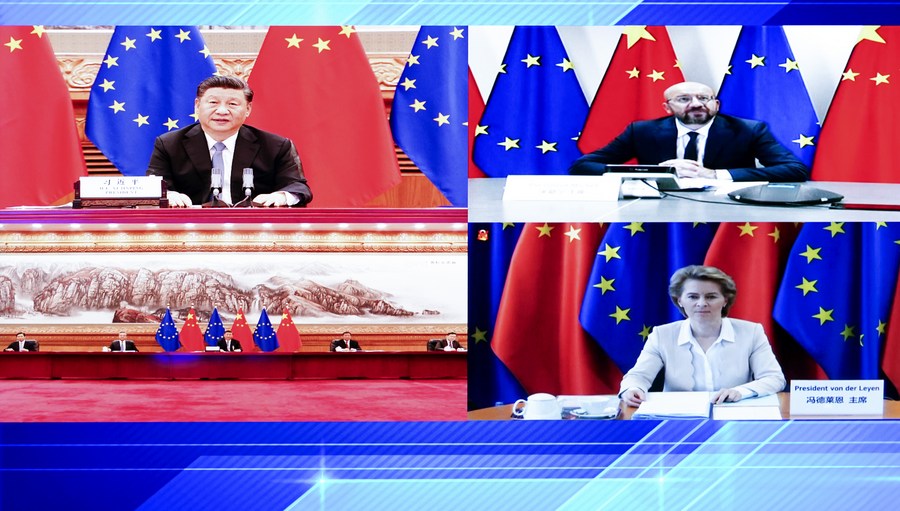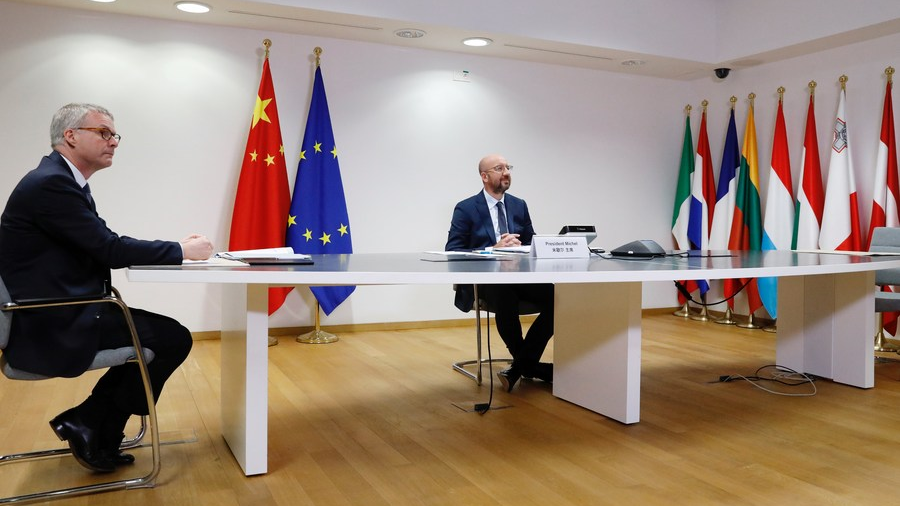
Chinese President Xi Jinping meets with President of the European Council Charles Michel and President of the European Commission Ursula von der Leyen via video link in Beijing, capital of China, June 22, 2020. /Xinhua
Chinese President Xi Jinping meets with President of the European Council Charles Michel and President of the European Commission Ursula von der Leyen via video link in Beijing, capital of China, June 22, 2020. /Xinhua
Editor's note: Azhar Azam works in a private organization as a market & business analyst and writes about geopolitical issues and regional conflicts. The article reflects the author's opinions, and not necessarily the views of CGTN.
The COVID-19 pandemic has swiped more than 477,000 human lives and teetered many top economies of the world while the strings attached to the deadly zoonotic disease, such as the lockdowns and social distancing, have unprecedented and pestilent strokes to all businesses, impelling them to dangle their operations or go to the wall.
In the middle of the intensifying challenges to the global economy, the International Monetary Fund – which posted a depressive worldwide economic outlook just a couple of months before the "Great Lockdown" and expected the global growth to tank by 3 percent – is likely to further strip its global economic forecast this week.
While the experts fear that the resurgence of coronavirus cases risks a tilt from a V-shaped to a U-shaped recovery, it is quite obvious that there is silver-bullet to reverse the slide down of global economy unless and until some joint, resolute and wholesome efforts are put in by the world's leading nations to promote cooperation by ironing out differences.
In such an attempt, the top leadership from China and the European Union (EU) on June 22 met via video link and discussed a range of issues relating to bilateral trade and investment, climate change, research and development on the coronavirus vaccine, peace and security, global supply chains and human rights, inter alia.
Although European Commission President Ursula von der Leyen and European Council President Charles Michel, accompanied by High Representative Josep Borrell, shared concerns over national security legislation for Hong Kong, but they highlighted the evolved China-EU ties, Europe's dependence on Beijing and importance of multilateralism and called on to work with Beijing to overcome the grave global issues, noting that engagement and collaboration with China were of "both opportunity and necessity."
Chinese President Xi Jinping, in return, reaffirmed Beijing wants peace instead of hegemony and pursues a path of peaceful development. He also said that China was prepared to liaise in green development and keep the global industrial and supply chains stable and smooth, urging both sides to maintain openness and accelerate the negotiation on China-EU investment agreement.
The EU bid for crucial partnership with China – be in terms of trade, climate, technology, or the defense of multilateralism – sounded its profound interests in forging an integrated China-EU approach and its alignment on vital international issues. The unanimity between the two of the world's largest economies on all-inclusive cooperation was also a clear rebuttal of protectionism and unilateralism, being assertively practiced by the United States.
As easing of lockdowns and opening of economic activities pave the way for steady China's recovery, the bright spots in the country such as new housing prices rose at its seven-month fastest pace in May, which made the consumer demand industrial output and investment gleamed hopes for the EU.
All the Chinese improving economic indicators emboldened the European economy, which has transitioned from the health situation of COVID-19 to the economic crisis, to return to normalcy by seeking cooperation from Beijing.
China is one of the biggest sources of imports to the EU and is the second-largest export market for European goods. Bilateral trade between the two averaged about 1.9 billion U.S. dollars a day in 2019 at a sunny growth rate of 8 percent.
According to Xinhua Factbox, investments by more than 3,200 Chinese firms last year created nearly 260,000 jobs in the EU – that described Beijing didn't show any complacency in honoring its investment commitments and has been keen to assimilate itself with the EU.
In the virus-triggered and naturally-driven new world order, decoupling from other economies of the world is an option almost impossible to withstand. The COVID-19 pandemic has redefined the globe in such a manner that no country can afford to alienate, and all states have to engage with each other diplomatically and economically for their survival and growth.

President of the European Council Charles Michel (C) attends the 22nd China-European Union (EU) leaders' meeting in Brussels, Belgium, June 22, 2020. /Xinhua
President of the European Council Charles Michel (C) attends the 22nd China-European Union (EU) leaders' meeting in Brussels, Belgium, June 22, 2020. /Xinhua
Being the two biggest traders across the planet, China and the EU can stimulate their economies by ramping up the reciprocal trade and fostering investment.
The endorsement by 63 percent European in a survey conducted by Roland Berger that China is one of the investment destinations was a key litmus test that Beijing continues to open up its domestic market for foreign firms.
With a 43 percent increase in the number of freight trains in May and roughly doubling of cargo transported, the outspread rail network can help both China and the EU to tap their real trade potential as well as lower the transportation costs drastically.
There is an almost one-third increase each in China-EU freight trains and shipments numbers to supply more than 12,500 tons of COVID-19 prevention supplies, which underscored how efficiently the grid boosted the joint response to the disease.
As stark challenges emerge in a post-pandemic era, a more bracing and more invigorating cooperation between Beijing and Brussels should be the pressing priority, which is also needed for the revival of global growth.
Like China, the EU has been trying to counter the aggressive attitude of U.S. President Donald Trump.
An eloquent, joint response to safeguard international rules-based system and promote multilateralism would help them push back the protectionist and revolting attitude of the U.S. president.
Brussels also needs to realize Beijing's rolling contributions toward the EU. While it expects China to meet its pledges under the 2019 China-EU summit and seeks advanced negotiations for an ambitious EU-China Comprehensive Investment Agreement, increased market access and Chinese engagement on future deliberations on industrial subsidies in WTO, the EU should evade indulging itself deeply into issues concerning China's sovereignty and must also stop targeting Chinese firms by imposing anti-dumping duties.
China and the EU's long-time relationship should not be wronged by a third country's wild goose chase, aimed at wedging differences between the age-old allies. It is, therefore, imperative for both to thwart divergences and continue the dialogue on strengthening cooperation, which is the only way to weather from the ongoing global economic and health exigency.
(If you want to contribute and have specific expertise, please contact us at opinions@cgtn.com.)